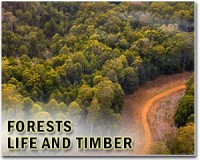| . |  |
. |
Freetown (AFP) July 7, 2010 The Sierra Leone government announced on Wednesday it had lifted a ban on unprocessed timber exports put in place in January to crack down on illegal logging. "The ban is lifted with immediate effect on the exploitation, transportation and processing of timber to satisfy the domestic market," it said in a statement. However a ban on exporting sawn timber would remain in place, it said. "Measures have been taken to address the current high level of environmental degradation resulting from the uncontrolled illegal harvesting and exploitation of timber currently taking place," it said. The navy arrested early Wednesday seven people in Sierra Leonean waters with a boatload of more than 100 logs heading for neighbouring Guinea. The European Union meanwhile voted Wednesday to outlaw illegal timber or products made from such wood, which makes up around one-fifth of all timber imports into the European Union, and to punish unscrupulous dealers. Much of the illegally harvested wood comes from forested African countries. West African nations such as Sierra Leone and Liberia, devastated by long, bloody civil wars, have been hard hit by illegal logging. In Sierra Leone senior trade officer Mohamed Sillah told AFP the ban had been successful in stopping the export of illegal timber. "Illegal smuggling of timber ... was prevalent mostly last year but when the ban was instituted, there was no known report of smuggling." "During that period, the effect on the economy was hard-hitting as the government was deprived of export duties, taxes and all that. Because it had to do with smuggling, it was difficult to have an accurate costing," he said. According to the United Nations, roughly 38 percent of Sierra Leone was forested in 2005. The country lost roughly 10 percent of its forest cover since 1990, although deforestation rates rose following the end of civil conflict in 2001.
more wood piles The demonstrators urged the Indonesian government in Jakarta to have a referendum on independence for West Papua, which was created in 2003 out of the larger Papua province to the east. The two provinces are the western half of the island of New Guinea. The eastern half of the island is the nation Papua New Guinea. West Papua and Papua provinces are the least populated and the poorest areas of Indonesian archipelago. But the two provinces are also some of the most mineral rich within Indonesia, especially for gold, timber and natural gas. Special autonomy was granted to Papua in 2001. But it has singularly failed to placate the population, most of which are Melanesian by culture and closer to aboriginal peoples than the Asian and Javanese majorities of most of Indonesia. The Free Papua Movement has been struggling for independence first from the Dutch when the island was a colony and then from Indonesia which, after its own independence, occupied Papua. Many of the movement's leaders claim that the central government in Jakarta and the mining companies aren't putting profits back into the province. Also, an influx of other cultures is diluting their own culture, at least in the major towns where the Melanesians are a minority to begin with. A large pro-independence demonstration occurred Jan. 27 when 1,500 people marched in Timika, a city in Papua province. The demonstrators demanded a referendum on the future status of West Papua. The rally took place without being attacked, despite recent violent incidents in the area. Three days before the rally, nine people, including a U.S. and a South African citizen, were shot and wounded by unidentified attackers at the nearby Freeport gold and copper mine. In December 2009 National police said they killed Kelly Kwalik, leader of the pro-independence Free Papua Movement, in a gun battle during an early morning raid on a house in the Timika. Kwalik was thought to have helped plan the fatal August 2002 ambush of a convoy of buses taking employees to the massive Grasberg gold mine run by U.S. company Freeport McMoRan Copper & Gold. Two American civilians and an Indonesian were killed in the worst attacks suffered by the mining business that excavates the 1-mile-wide open pit, the world's largest producer of copper. Kwalik was also blamed for the attack in July 2009 in which an Australian technician and two other mining employees were killed in a similar ambush. The government in Jakarta has been deploying security forces in base camps within the jungles of West Papua. But the mostly disparate and poorly armed groups of rebels move freely around the province.
Share This Article With Planet Earth
Related Links Forestry News - Global and Local News, Science and Application
 Paper's toll on Indonesia's rainforests
Paper's toll on Indonesia's rainforestsJakarta (UPI) Jul 7, 2010 Greenpeace chastised Indonesian palm oil and paper giant Sinar Mas, as well as its customers, for destroying rainforests and carbon-rich peat lands in the country. In its report, "How Sinar Mas is Pulping the Planet," Greenpeace named a number of major international retailers, restaurants and supermarket chains as sourcing products from Asia Pulp and Paper, a subsidiary of Sinar Mas. ... read more |
|
| The content herein, unless otherwise known to be public domain, are Copyright 1995-2010 - SpaceDaily. AFP and UPI Wire Stories are copyright Agence France-Presse and United Press International. ESA Portal Reports are copyright European Space Agency. All NASA sourced material is public domain. Additional copyrights may apply in whole or part to other bona fide parties. Advertising does not imply endorsement,agreement or approval of any opinions, statements or information provided by SpaceDaily on any Web page published or hosted by SpaceDaily. Privacy Statement |